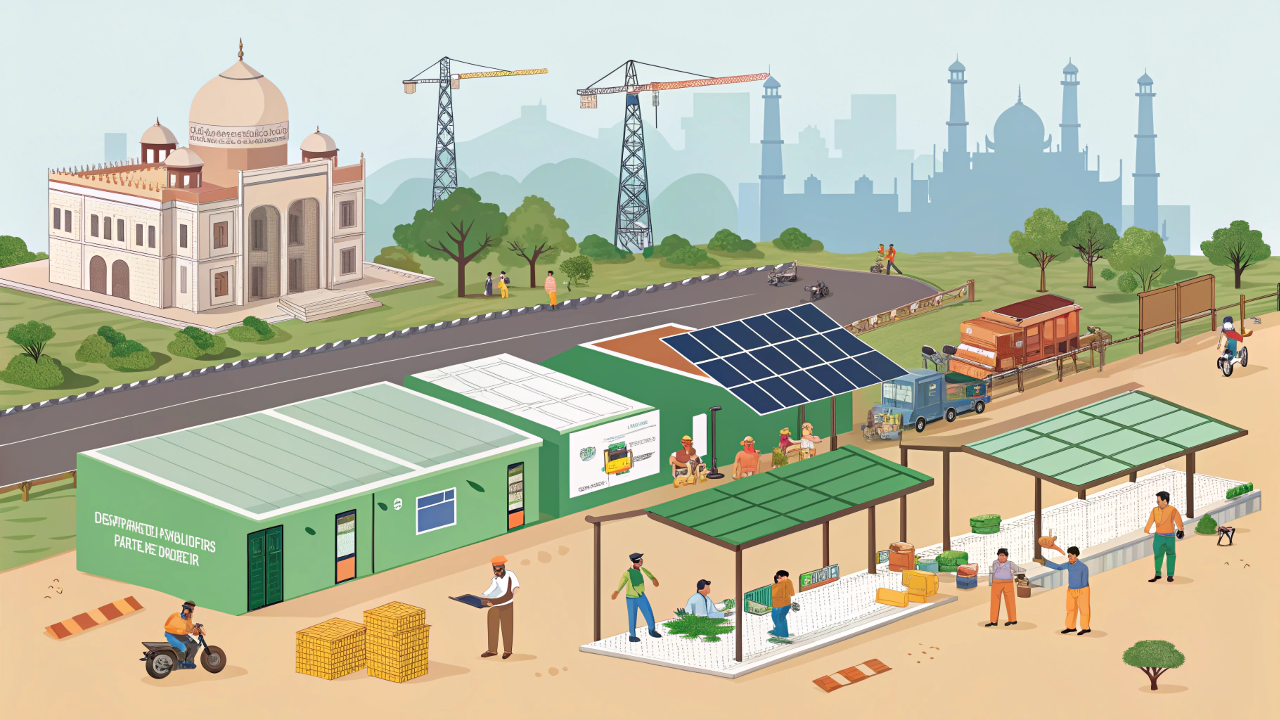
Introduction
As global investors increasingly prioritize Environmental, Social, and Governance (ESG) factors, India’s infrastructure sector is experiencing a transformative shift. Sustainable and green infrastructure development now sits at the heart of India’s ambitious $1.4 trillion National Infrastructure Pipeline (NIP), with a focus on renewable energy, low-carbon transportation, and eco-friendly urban planning. With rising demand from multilateral agencies, private investors, and international lenders, India is adopting stringent ESG standards across roads, railways, energy, real estate, and water management. This blog explores how ESG compliance is reshaping India’s infrastructure investment landscape and the opportunities it offers to global investors.
Why ESG Matters in India’s Infrastructure Sector
1. Global Shift Towards Sustainable Financing
- Over $100 billion in ESG investments are committed to India by 2030.
- Sovereign funds, pension funds, and global banks are prioritizing ESG-compliant projects.
- Green bonds and climate finance are driving infrastructure sustainability.
2. Government Regulations & Policy Push
- 100% FDI is allowed in renewable energy and green infrastructure projects.
- Mandatory ESG reporting for large corporations is enforced by SEBI regulations.
- Incentives are provided for low-carbon urban mobility and electric vehicle (EV) infrastructure.
Key ESG Trends in India’s Infrastructure Development
1. Green Energy & Sustainable Urbanization ($500 billion)
- India targets a renewable energy capacity of 500 GW by 2030.
- An increase in green building projects featuring net-zero emissions and LEED certification.
- Smart Cities are integrating AI and IoT for energy efficiency.
2. Low-Carbon Transport & Mobility ($150 billion)
- PPP-based metro rail and electric bus networks are reducing emissions.
- The Mumbai-Ahmedabad Bullet Train is incorporating green technology.
- EV charging infrastructure and hydrogen-powered mobility are expanding.
3. Sustainable Water & Waste Management ($100 billion)
- Desalination, wastewater recycling, and rainwater harvesting in Smart Cities.
- Circular economy principles are being applied in urban waste management.
- PPP-led green sewage treatment plants and industrial water reuse projects are in progress.
Business & Investment Opportunities in India’s ESG Infrastructure
1. Green Bonds & ESG-Focused Investments
- Over $10 billion raised through green bonds for infrastructure projects.
- Foreign investors are tapping into India’s sustainability-linked debt market.
- Climate financing from organizations like ADB, World Bank, and AIIB is supporting ESG projects.
2. Technology-Driven Sustainability Solutions
- AI and blockchain are being integrated for ESG compliance and monitoring.
- Carbon credit trading and emission reduction projects are emerging.
- Smart grid and renewable energy storage systems are attracting investments.
3. Public-Private Partnerships (PPP) in ESG Projects
- Green PPP projects are driving metro, water, and waste management innovations.
- FDI-backed sustainability initiatives are growing in industrial parks and SEZs.
- ESG-compliant urban infrastructure is drawing attention from sovereign wealth funds.
Challenges & Solutions
1. Lack of Standardized ESG Regulations
- Solution: India is introducing Green Taxonomy and sustainability frameworks to standardize ESG practices.
2. High Initial Investment for Green Infrastructure
- Solution: Viability Gap Funding (VGF) and blended finance models are being used to reduce investment risks.
3. Limited Awareness of ESG Compliance
- Solution: Capacity-building initiatives are being implemented for businesses and government agencies to promote ESG awareness and compliance.
The Future of ESG in India’s Infrastructure
- ESG will be a defining factor in infrastructure financing by 2030.
- Emerging technologies like green hydrogen, AI-driven smart grids, and circular economy infrastructure will be central to future development.
- The focus on ESG-driven FDI and climate finance will support the growth of sustainable urban projects.
Conclusion
India’s infrastructure sector is rapidly aligning with global ESG standards, unlocking new investment opportunities for foreign firms, EPC contractors, and sustainable technology providers. With government support, green financing, and digital transformation, India is positioning itself as a leader in sustainable infrastructure development.
External References & Citations
- Ministry of Finance – Green Bonds & ESG Investment Reports
- SEBI India – ESG Disclosure & Compliance Guidelines
- World Bank India – Sustainable Infrastructure Development
- Asian Development Bank (ADB) – ESG in Infrastructure Financing
- PPP India – Public-Private Partnerships in Green Infrastructure






